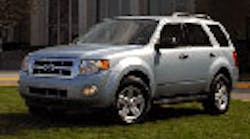The Electric Power Research Institute (EPRI) has agreed to a three-year deal with Ford Motor Co. to develop and evaluate technical approaches for integrating plug-in hybrid electric vehicles (PHEVs) into the U.S. electric grid system in an attempt to help facilitate widespread use of plug-in vehicles.
EPRI will test Ford Escape PHEVs with the collaboration of New York and New Jersey area-utilities, building on the previously announced partnership between Ford and Southern California Edison (SCE) to advance PHEVs.
Ford is building 20 Escape PHEVs for Los Angeles-area testing under the Ford-SCE partnership, which is aimed at the development of common standards among utilities for accommodating PHEV vehicles
“This partnership represents a concerted effort by the transportation and electric sectors to work together in advancing PHEV technology,” said Mark Duvall, EPRI program manager for electric transportation. “This effort should accelerate the pace of PHEV development while enabling the utility industry to prepare for the introduction of these vehicles.”
The analysis of the Ford PHEVs will focus on battery technology, vehicle systems, customer usage and grid infrastructure, as well as possible stationary and secondary usages for advanced batteries, EPRI said.
The agreement is the latest development in the industry-wide goal of putting plug-in hybrids into service. According to the non-profit Institute for the Analysis of Global Security (IAGS), if a driver’s commute is shorter than a car’s electric range, he or she would never have to fill the fuel tank when driving to and from work, thus helping reduce dependence on foreign oil.
Plug-in hybrids could sustain a top speed of 97 MPH and are about half the price to operate while reducing emissions by 50%, the group added.
Ford is not the only manufacturer currently developing PHEV technology. General Motors is hoping to get its Chevrolet Volt passenger car on the market by the end of 2010. The Volt will use no gasoline and emit no emissions for those who drive less than 40 miles per day, GM said.
“We have devoted significant resources to this project: Over 200 engineers and 50 designers are working on the Volt alone, and another 400 are working on related subsystems and electric components,” said Tony Posawatz, vehicle line director of E-Flex systems and the Chevy Volt for GM. “That’s how important we think this is, and that’s how much stock we place in the future of extended-range electric vehicles like the Chevy Volt.”
DaimlerChrysler has been testing a plug-in hybrid version of its Dodge Sprinter van-- although, like Ford and GM, they have not announced when it will be commercially available.
The ‘Big Three’ U.S. automakers were given poor marks in ‘green’ technology in a recent Forbes study, which asserted that Honda was the world’s greenest major automaker in 2007, followed by Toyota, Hyundai Kia, Volkswagen, and Nissan, with Ford, GM and DaimerChrysler coming in at the bottom of the list.



